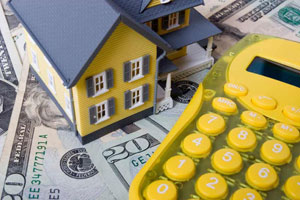Should I Pay Off My Mortgage Early?
By Gretchen Wegrich Updated on 7/26/2017
Most homeowners dream of owning a house and being able to stop making mortgage payments. In fact, most homeowners have dreamed paying off their mortgages early. Even making one extra payment per year on a $200,000 mortgage could save upwards of $65,000 in the long run.
The problem is that most people don't stay in their homes for thirty years to pay off a 30-year mortgage.
Moreover, when mortgage rates are low the benefits of paying off a mortgage early aren't as lucrative. Many financial planners believe there are better ways to invest the extra money instead of paying off a mortgage early.
Is paying off my mortgage right for me?
The first step is to figure out if you need to apply the extra money to anything else such as credit card debt or any other high-interest loans. If the answer is no, the second step is to look into your various retirement accounts.
You should be maximizing your employee and individual retirement accounts before putting the extra cash towards paying down your mortgage early. If you are currently doing that, consider whether or not you need life insurance or have an emergency fund.
Life insurance is recommended for everyone with dependents, and most financial advisors recommend having an emergency fund that can cover anywhere from six months to a year's worth of living expenses.
Who should pay off their mortgage early?
If you are in a good financial situation, you can consider paying off your mortgage early. Specifically, paying off a mortgage can benefit some homeowners over others, such as homeowners who don't use mortgage interest as a tax break and homeowners who pay private mortgage insurance.
If you do decide to pay off your mortgage early, all you will have to do is make an extra payment at the end of the year. You'll have to specify that the payment should be applied to your mortgage's principal. Verify that your specific mortgage has no early payment penalties.
Most conventional mortgages aren't subject to early payment penalties, but other mortgage types such as ARMs are subject to early payment penalties.
Can I pay off my ARM mortgage early?
Adding the same amount to your payment every month will not reduce the length of your mortgage term by more than a few months. When an ARM’s interest rate changes, the payment is recalculated, so the loan will be paid off in the original term period.
Basically, your extra payments towards paying off your mortgage early will lessen the monthly payment, which is relative to what it would be had those payments not been made.
This difference between adjustable-rate and fixed-rate mortgages is very important when trying to figure out whether or not to pay off a loan early.
When borrowers make payments on a fixed-rate mortgage, the term is shortened, but the payment is not. When borrowers make payments on an adjustable-rate mortgage, the amount is adjusted, but the term is not.
The only way for an ARM mortgage length to be decreased is to increase the payment at every single rate adjustment date.
Can I refinance my loan to pay off my mortgage early?
If you have a fixed-rate mortgage, another option would be to refinance your home loan. If you have enough cash to make bigger payments, see if you can afford to refinance your mortgage to a 15-year mortgage. That way, you can pay off your home loan early while still benefitting from the tax deduction.
Paying off your mortgage early isn't the right option for every homeowner. Talk to your lender for valuable input and expert advice about what option is right for you and your current financial situation.

Didn't find the answer you wanted? Ask one of your own.
-
 Mortgage Banking Specialty Programs in New York
View More
Mortgage Banking Specialty Programs in New York
View More
-
 What Is Joint Tenancy?
View More
What Is Joint Tenancy?
View More
-
 How to Transfer a Mortgage
View More
How to Transfer a Mortgage
View More
-
 How Can I Qualify for the Mortgage Tax Deduction?
View More
How Can I Qualify for the Mortgage Tax Deduction?
View More
-
 What Happens if I Miss a Mortgage Payment?
View More
What Happens if I Miss a Mortgage Payment?
View More
-
 What Is a Mortgage Payment?
View More
What Is a Mortgage Payment?
View More
-
 3 Things You Should Know Before You Switch Mortgage Lenders
View More
3 Things You Should Know Before You Switch Mortgage Lenders
View More
-
 Mortgage Glossary
View More
Mortgage Glossary
View More
-
 Online Mortgage Services to Get You the Best Home Loans
View More
Online Mortgage Services to Get You the Best Home Loans
View More
Related Articles
Ask our community a question.
Searching Today's Rates...

Featured Lenders
Kat Whitman
Whitman Met, Inc.
Sacramento, CA
Lisa Stepp
RBS Citizens
Clifton Park, NY
Cameron Burke
Vision One Mortgage
Huntington Beach, CA

